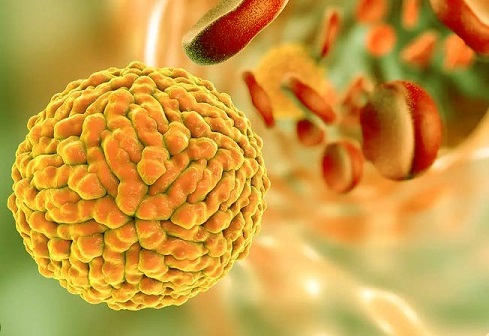Sebastian Lavoie Fact checked by:Thailand Medical News Team Sep 10, 2024 1 year, 4 months, 4 days, 20 hours, 19 minutes ago
Medical News: Zika virus (ZIKV), a mosquito-borne virus linked to severe neurological disorders, has been a subject of intense research over recent years. A new study from the Institute of Virology at Philipps-University Marburg in Germany and Institute of Virology and Cell Biology at the University of Lübeck-Germany has uncovered a novel approach to inhibit Zika virus replication by targeting a key enzyme in the body. This
Medical News report highlights how the enzyme Sterol O-acyltransferase 1 (SOAT1) plays a significant role in the virus’s ability to infect and replicate in human cells, particularly in brain organoids. The study sheds light on the importance of the SOAT1 enzyme and its potential as a target for antiviral therapies.
 New study reveals blocking key enzyme can inhibit Zika virus replication
Zika Virus and Its Threat to Public Health
New study reveals blocking key enzyme can inhibit Zika virus replication
Zika Virus and Its Threat to Public Health
Zika virus (ZIKV) has historically been transmitted through mosquitoes, primarily in tropical and subtropical regions. Although infections are typically mild, recent outbreaks have linked the virus to serious complications such as Guillain-Barré syndrome in adults and microcephaly in newborns when the infection occurs during pregnancy.
As of 2021, over 89 countries and territories have reported active ZIKV transmission. Understanding how ZIKV replicates within human cells is crucial in developing effective treatment options to curb the virus's spread.
Flaviviruses, including ZIKV, are known to hijack host lipid metabolism pathways to facilitate their replication. Previous studies have indicated that cholesterol plays a crucial role in the replication of related viruses such as dengue and hepatitis C. The recent study conducted by a team of virologists sought to investigate whether specific enzymes involved in lipid synthesis could be targeted to block ZIKV infection.
Key Findings: SOAT1 as a Crucial Player in Zika Virus Replication
The research team systematically investigated the role of enzymes involved in synthesizing neutral lipids in ZIKV replication. They specifically focused on SOAT1, which is responsible for esterifying cholesterol to maintain cellular cholesterol balance. Using RNA interference techniques, the scientists downregulated the expression of SOAT1 and other enzymes in hepatoma cells, which are commonly used to study viral infections. The study demonstrated that downregulating SOAT1 significantly compromised ZIKV infection, leading to reduced viral titers and protein levels.
The researchers further explored the impact of SOAT1 inhibition using pharmacological inhibitors. They treated infected cells with SOAT1-specific inhibitors such as K604 and ATR-101. Notably, SOAT1 inhibition decreased the amount of viral RNA and E proteins in the cells, suggesting that ZIKV morphogenesis was impaired. This result was even more pronounced in neural cell culture models and cerebral organoids, which mimic the brain's environment. By blocking SOAT1, the virus was unable to replicate efficiently, thus reducing its ability to spread.
ong>Cholesterol Imbalance and Viral Morphogenesis
One of the critical observations made during the study was the accumulation of free cholesterol in SOAT1-inhibited cells. Normally, cholesterol is esterified by SOAT1 to prevent toxicity from excess free cholesterol. However, when SOAT1 was inhibited, this process was disrupted, leading to a buildup of cholesterol within the cells. The imbalance between free and esterified cholesterol appeared to hinder ZIKV replication.
The team also observed that while SOAT1 inhibition reduced ZIKV replication, inhibiting another enzyme, DGAT1, did not have the same effect. DGAT1 is involved in synthesizing triglycerides, and its inhibition did not significantly reduce viral infection. This suggests that cholesterol, rather than triglycerides, plays a more critical role in ZIKV replication.
Implications for Antiviral Therapy
The findings from this study have significant implications for developing antiviral therapies targeting ZIKV. The identification of SOAT1 as a host dependency factor for ZIKV replication opens the door for new therapeutic strategies. The fact that SOAT1 inhibition can effectively block ZIKV replication in neural cells and brain organoids is particularly promising, given that ZIKV is known to cause severe neurological damage in infants.
Moreover, SOAT1 inhibitors are already being explored in the context of other diseases, such as cancer and metabolic disorders. Drugs like ATR-101, which has been shown to inhibit SOAT1 activity, could potentially be repurposed for treating ZIKV infections. However, further research is needed to determine the safety and efficacy of such treatments in humans.
Conclusion: A Promising Avenue for Future Research
In conclusion, the study findings underscore the importance of cholesterol balance in ZIKV replication and identify SOAT1 as a critical enzyme in this process. By inhibiting SOAT1, researchers were able to significantly reduce the virus's ability to replicate in human cell cultures and cerebral organoids. These findings pave the way for future research into antiviral therapies that target host metabolic pathways to block viral infections.
The study highlights the potential of SOAT1 inhibitors as a new class of antiviral drugs that could be used to combat ZIKV and other flaviviruses. Given the devastating impact of ZIKV on pregnant women and newborns, developing effective treatments is essential to preventing future outbreaks.
The study findings were published in the peer-reviewed journal: Communications Biology.
https://link.springer.com/article/10.1038/s42003-024-06776-4
For the latest on Zika Virus, keep on logging to Thailand Medical News.
Read Also:
https://www.thailandmedical.news/news/taiwanese-study-shows-that-rhodiola-crenulate-extract-can-inhibit-zika-virus-and-japanese-encephalitis-virus
https://www.thailandmedical.news/news/breaking-medical-news-zika-virus-can-be-used-to-treat-neuroblastoma-cancer-in-children
